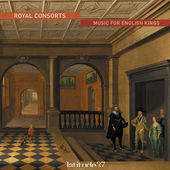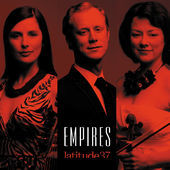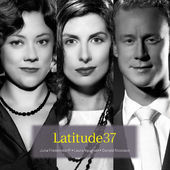
Recordings
Royal Consorts - Music for English Kings (ABC CLASSICS)
Delve into the world of 17th-century England, with music written for kings and nobles during the tumult of the Civil War, and tunes which reverberated in town houses and taverns throughout the country.
Latitude 37, performing on instruments that the composers themselves would have known, bring to life the music of the 17th-century English Civil War – including the world-premiere recording of a lost work. The album also features a selection of guest artists hand-picked from Australia’s finest musicians.
At the heart of the album stands music by composers intimately involved with the royal court, at a time when its very existence was challenged like never before. William Lawes (1602–1645), who composed for King Charles I for most of his life, was dubbed ‘Father of music’ by the king after he was killed whilst fighting for the royalist cause. Henry Purcell (1659–1695) – the finest English composer of his generation, with a number of positions at court – is represented here by the exquisitely beautiful lament ‘Let Me Weep’, sung by rising star soprano Alexandra Oomens, and a masterful instrumental Fantasia.
Empires (ABC CLASSICS)
During the 17th century the borders of the Germanic Holy Roman Empire were being threatened by the mysterious and powerful Ottoman Empire, and it is from here that much of the disc draws its musical inspiration.
The music of the Holy Roman Empire presents repertoire of immense colour, gesture and raw emotional power, represented on this album in the music of Johann Christoph Bach (the nephew of J.S. Bach’s grandfather), Buxtehude, Biber and Gottfried Finger. Germany’s Lutheran religion put much value on the communicative powers of music, and the immense despair felt by the nation after thirty years of religious conflict was also expressed through its music.
Juxtaposed against this music from the Holy Roman Empire is an exploration of music from its borderlands with the Islamic Ottoman Empire. Borderland countries switched allegiances frequently and many cultures we know now as Eastern European were permanently spiced by the influence of the Turks. Nowhere is this more evident than in the fascinating musical sources from the regions of Croatia and Moldavia, to which Latitude 37 has turned for much of the music on Empires. Western keys intermingled with Middle Eastern modes, and Arabic rhythmic intricacies blended with European duple and triple metres, creating a new sound that portrays quite clearly how these musical traditions, rather than going to war against one another, sought inspiration from each other instead. Empires also includes music by Dimitrie Cantemir, the fascinating Moldavian prince who became a great scholar of Turkish classical music while living in Constantinople.
To demonstrate these colourful musical interactions, Latitude 37 has opted to surrender the Baroque theorbo and incorporate its Arabic predecessor, the oud. European bass drum and tambourine share the stage with Turkish percussion including the daf, riq and the ceramic dahola, all united by the common thread of violin, viola da gamba (an instrument that itself has Arabic origins) and harpsichord to create an album that is both vital and poignant.
Latitude 37 (ABC CLASSICS)
Imagine ‘pop music’ of the 17th Century – the hip tunes, the attention grabbing hooks, the musical show pieces – and then transfer it to the 21st Century. That’s what you get with Latitude 37’s self titled debut album.
Named after the latitudinal position which links Melbourne, Australia, to New Zealand, Latitude 37 is an exciting Baroque trio whose members were drawn together by their passion for historically informed performance of 16th-, 17th- and 18th-century music.
Comprising some of the top graduates of the Royal Conservatory in The Hague, reunited after years of extensive research and international experience playing with many of the finest ensembles and artists in Europe, America and Australasia, Latitude 37 represents a new generation of period instrumentalists who share a unified interest in cultivating and communicating their ancient art for the modern era.


